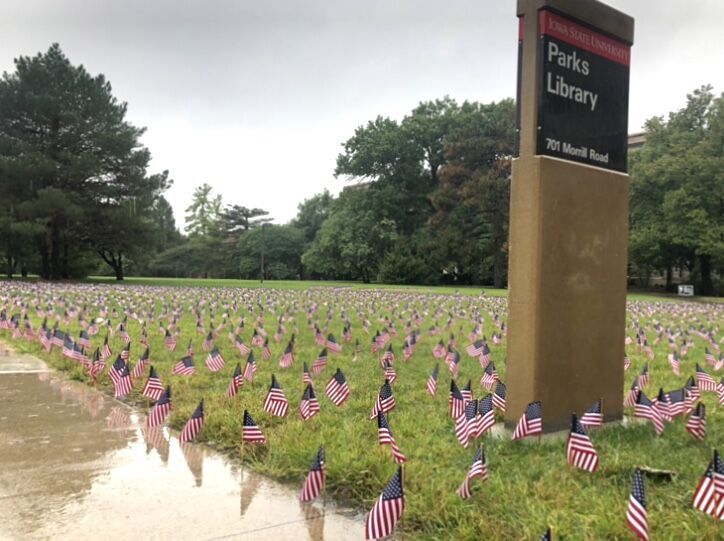The Gen Z response to 9/11
September 11, 2020
Growing up in a post-9/11 world, many individuals that are a part of Generation Z did not experience firsthand the pain and tragedy that occurred on that day, desensitizing them to the true impact it had on the United States.
Throughout the day, Twitter’s trending page was filled with political statements and hashtags, only one of which honored 9/11. Many 9/11 memorial posts across social media came from older users and political figures.
On Sept. 11, 2001, a terrorist attack targeted the United States and resulted in the deaths of 2,977 lives and over 25,000 injuries, including many firefighters, paramedics and law enforcement officers.
On Sept. 11, 2020, fires are engulfing the west coast, and the deadliest pandemic in a century is ravaging the world.
Gen Z has grown up in a world full of tragedy, and though they hear of the horror that was 9/11 in class and from parents, they did not live through it and therefore are not able to relate to the people that did.
They feel sympathy and empathy and may have even lost loved ones, but without consciously living through the emotional impact, they will never feel the full weight of what happened on Sept. 11, 2001.
They grew up in a post-9/11 world, and the things that were drastic changes for those that lived before just became normal parts of life for Gen Z.
But as the long-lasting effects of 9/11 have taken root in Gen Z’s childhood, the consequences of that day have unconsciously shaped sociological world views.
“I think growing up in a post-9/11 world has, ironically, made me more cynical of nationalism and patriotism. 9/11 does not carry the same emotional weight with me as it does with someone who actually lived through it,” said Walker Ochs, junior in global resource systems.
“Honestly, I’m more upset by the rampant Islamophobia that is rationalized in America because of 9/11 rather than the comparatively small loss of life,” Ochs said. “Sixty-five times more people have already died this year from coronavirus in the U.S. I guess I’m just upset that such a sad and awful event has been used to justify more hate and harm, mostly directed toward Muslims in America.”
Alexa Glandon, sophomore in biology, was born in February of 2001, making her 7 months old when the attack happened.
“Growing up in school, we were always told about it and that it needed to be remembered in order to not let it happen again,” Glandon said. “As I grew up and more generations were brought up after me, it seemed as if it was starting to become not as big of a deal and wasn’t exemplified as much. Now, as an adult, I don’t see it pushed into people’s memories as much or really hear about it ever.”
Glandon said that at her work today, even a few of her co-workers said they forgot that today was 9/11. She also said that it has shaped her outlook on matters such as racism and xenophobia.
“Obviously, there are still memorials and things put up when 9/11 comes around, but other than the actual day of 9/11, no one talks about it,” Glandon said. “This is upsetting because it was a great tragedy to this country, but I also believe that 9/11 was a match for the seemingly uncontrollable fire that is racism and prejudice toward Middle Eastern people in America.”
Glandon went on to say that even though she may not remember the event, she still sees the effects of it.
“I may not remember 9/11 because I was too little, but I do remember and still see the racism and hate that this country developed as a sort of coping mechanism,” Glandon said.
Mack Shelley, chair of the political science department, said generational differences can affect the way one views significant events that they may have not lived through.
“9/11, for you, is ancient history,” Shelley said. “You weren’t around when that happened. I wasn’t around when Pearl Harbor happened, but I do understand through what other people have told me. Things you haven’t experienced personally, that you sort of experienced vicariously or by reading about it…the hope is those things have some impact.”
He also talked about the strong sense of hyper-nationalism that followed 9/11, including acts of violence toward those who appear to be of Middle Eastern descent.
“People who were either from the Middle East, especially the Arab countries, they were sometimes attacked, beaten up and occasionally killed,” Shelley said. “You have this blurring of understanding about the fact that not everybody who is Islamic to begin with thinks alike.”
Although Gen Z did not live through 9/11, there are still ways to remember and honor the attack that don’t perpetuate racism or Islamophobia. These can include creating conversation with those that did live through it and examining the long-term effects it has had on society.
“I think the best way for those in Gen Z to remember and honor those who died in 9/11 is to revisit the situation through the internet,” said Charles Klapastauskas, junior in mechanical engineering and president of Iowa State’s Young Americans for Freedom. “Watch news clips, live shots and listen to the heartbreaking phone calls loved ones made in their last moments. There is no way for our generation to truly understand the magnitude of the situation, as we weren’t able to comprehend, but revisiting that fateful day is a close second.”
Both consciously and unconsciously, the events of 9/11 shaped the way society was viewed and developed, even for younger generations that did not live through it.

















